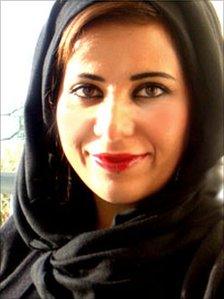Bahrain election: Voters' views
- Published
Bahraini voters are heading to the polls for parliamentary elections, as tensions run high between the Sunni-led government and the country's Shia majority. The government has detained opposition leaders, shut down newspapers, and charged 23 prominent activists with plotting a coup.
Prior to today's vote, ordinary Bahraini voters have been sharing their views with the BBC Arabic service. Here are some of their comments, translated from the original Arabic report by Faisal Irshaid.
Maryam Hadi, Journalist
The fact that there is a representative parliament in Bahrain is something to be proud of and a step in the right direction for the country.

Maryam Hadi says the elections will be free and fair
It's a relatively new experience in the region and we should make the best of it. But I don't think it's the right time yet to pass a verdict on the parliament as it's relatively young.
The current tensions in the country are due to a small group who are opposed to the democratic process. The elections can ease those tensions. The opposition was present in the parliament in 2006 and still is, despite recent events, and this is a good thing for Bahrain.
I believe that the next parliament will be a democratic one where representatives are chosen by the people in a credible and transparent manner. Past elections point in that direction, such as the 2006 poll when the Wifaq party, the main opposition party, won many seats. If there was no transparency, why would the government allow these seats to be won by the opposition?
Some important issues for me are housing and increasing wages.
Hani al-Shiekh, Political activist
The elections will be lukewarm since a large segment of people has already lost any hope of change. I have decided to participate to expose the erosion of power and identify the mistakes of the current government.
Many argue that the elections will ease tensions, but that is not entirely true. Tensions are caused by the government, as it discriminates against citizens and exercises oppression and humiliation on an ongoing basis. In addition, it always requests the declaration of loyalty to the throne rather than to the country. Therefore, I believe discrimination will continue and the government will continue to suppress the opposition.
The government controls the parliament through an unfair system of constituencies that ensures the loyalty to the king through the unequal distribution of votes. The power of the lower house has been reduced in favour of the appointed Shura Council which is loyal to the king.
I think constitutional reform is the most important issue. Is it important to restore the constitution of 1973, which was taken from the people in 2002, and for the lower house to have the power of legislation. Otherwise, problems will never cease.
Abu Abdul Aziz, Businessman
The elections will be fair, and the proof of that is that a number of Shia opposition representatives won unopposed in their constituencies [in the last election]. Does this happen elsewhere?
The participation of the opposition in parliament does not indicate whether stability will take place or not. The issue is regional stability, and as long as there is instability in the region, specifically with Iran, the situation in Bahrain will remain unsettled.
I am against the classification of citizens according to their sect, and against the sectarian representation; it brings us back to medieval times. As for the human rights organisations which claim the cases of torture by the government, I doubt their impartiality and believe that they are politically motivated.
Elections send a message to those who advocate violence and boycott. The only way to resolve disputes is through the elected parliament.
Abu al-Fadel
I strongly call upon everyone to participate in the parliamentary elections; they are an expression of democracy. There are a number of issues in Bahrain that are particularly important, including the issue of freedom of opinion and the issue of naturalisation of foreigners.
I expect a landslide victory for the opposition in case there is no fraud - they have the right to vote and represent the majority. But it is difficult to have free and fair elections with the lack of transparency.
In my opinion, the elections will increase the tension. If the opposition wins, there will be splits within its factions. On the other hand, there is sectarian violence happening in the street caused by the tension happening in parliament.
Ali Jassem, Student
I am boycotting the parliamentary elections as it won't lead to change. Parliament is weak. Participating in it means insulting the majority - the Shia community. How do you expect us to get into parliament with the minority of seats while we are the majority in terms of number?
I believe that fraud will take place, especially in the public polling centres that are not subject to control.
The most prominent issues in my opinion: Citizenship, amending the constitution, reforming property laws, and guaranteeing freedoms. The recent security crisis was just another attempt by the government to prevent some parties from entering the elections because they touched upon many issues that expose the state.
- Published24 October 2010
- Published21 October 2010
- Published8 September 2010
- Published5 September 2010